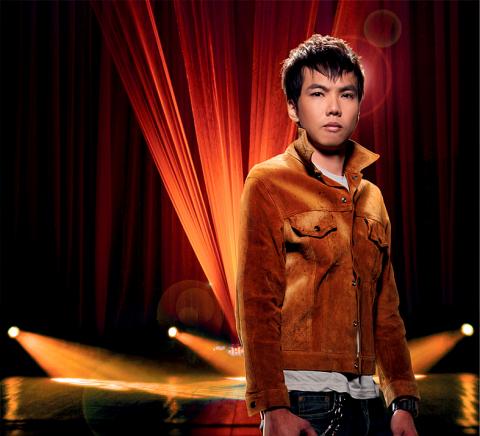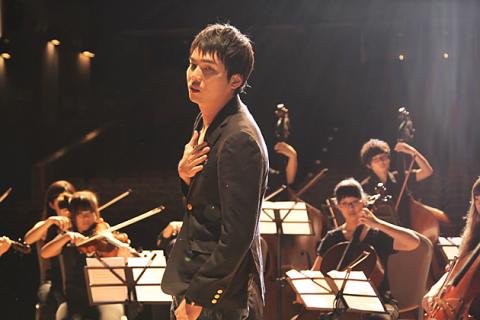Brown Chen (陳志偉) says that when his group’s self-titled debut Da Xi Men (大囍門) was released in 2005, he wasn’t ready.
“I was way too young,” he told the Taipei Times last week. “In the Taiwanese recording industry, if you waste a chance you are gone. The funny thing is, they don’t tell you they are not going to release your next album. They just say, ‘Keep working on it.’ After I had made four demo albums, one each year, I asked my manager about a song. He replied, ‘What song?’ so I finally got it.”
Chen had a lot of contacts, and he decided to put out the album independently. He cherry-picked the best songs from the four demo albums and released X.

Photo Courtesy of Mr Brown
“I’m lucky, because then I won the Golden Medley Award,” he said, referring to Da Xi Men’s victory in the best vocal group category last year.
Now, Chen is back with a new moniker, Mr Brown (布朗), and a new album, titled H.A.R.D. (用力專輯), which was released yesterday. This time he’s prepared for success.
“I won’t say it’s my time, but I will say I’m ready,” Chen said. “I’ve been doing my music for n ly 10 years and I have seen the good and bad. I’m grown up now and music is my job.”

Photo Courtesy of Mr Brown
The underlying theme of Chen’s new album is ordinary people’s passion. The first single, Light Up My Fire, was influenced by sports.
“I’m producing a movie about people playing soccer in Taiwan, so I went to visit a lot of teams, both pro and amateur,” Chen said. “It seemed to me like the amateurs had more passion. Sometimes they didn’t feel good or sometimes they were hurt. Sometimes it was even raining, but they still wanted to play basketball. They kept going. They light up their own fire.”
Light Up My Fire will be featured in commercials for the New Year’s Eve celebrations in front of Taipei City Hall, where Chen will be performing to a huge crowd.
“The officials contacted me and said to make a song sampling an old Chinese song,” he said. “I did that but didn’t really think it was very good. I told them I had a better one from my new album and they picked it.”
Chen says he works hard at producing songs, but also knows how to have a good time.
“In my life, I party a lot. Why not have a party song on the album?” he said, referring to his second single, the electro-influenced Champagne.
In the chorus, Chen chants: “We need more champagne/We need more champagne” over and over, but the song also carries a deeper message.
“I don’t want to say I’m the party king. I want to explore the reason why we party,” he said. “I think everyone enjoys having a celebration even if they don’t have much money. It’s an easy way to make everything better.”
NEW STYLE
After rapping for the first two albums, Chen wanted to change his style and try something new.
“I didn’t want to only rap. I wanted to rap, sing, and rap with the melody, kind of like Bone Thugs-N-Harmony,” he said. “I was practicing and practicing and thinking ‘I can’t do this new style.’ Finally, one day I wrote a song and recorded [it] and went to bed. The next day I listened to it and realized I got it. Then, the songs just started pouring out.”
The breakthrough song was Life, which is dedicated to people with “uncool” jobs, like bus drivers.
“They may do the same things every day, but they are doing it for their families and kids and that’s great,” he said.
Chen also used the simple experience of buying fried chicken as inspiration for Neon Lights. While he was waiting for his order to be cooked at a popular fried chicken stand, he noticed a blind woman pass by. Then, she walked by again. The third time, Chen stopped her and asked her where she was going. The blind woman said she was trying to find the fried chicken stand they were standing in front of.
“The woman was so happy because she had finally found it. I feel like we are lucky because we don’t have a hard time doing something as simple as getting fried chicken,” Chen said. “Many people say they can feel handicapped people’s pain, but that’s bullshit. With this song, I’m saying I can’t feel your pain but I can let you know you are not alone.”
DUBSTEP
Neon Lights pushes the envelope of Taiwanese pop music by including a dubstep break toward the end.
“To create dubstep, you have to have a lot of imagination,” Chen said. “I think that matches what blind or sick people have to go through all the time.”
Since Chen is maturing in his music as well as life, a few of the songs are about the ups and downs of love.
“Sometimes we have relationships that are one night, one month, or one year, but what is real love?” Chen asked.
“Right before I wrote Eternity, I drove my scooter up to Yangmingshan and saw an old couple going very slowly up the hill. I drove around for an hour and saw many couples kissing. Then on the way down, I saw the same couple still going up. Maybe they are very simple and aren’t romantic, but they will stay together for their whole life.”
When asked about his own love life now that he’s becoming a star, Chen laughed: “I like pretty girls. But pretty girls are a problem.”
With a wide variety of styles, all of the songs on H.A.R.D have one thing in common. “I like groovy music. Whether it’s electro, funk, dubstep or hip-hop, I try to make everything groovy,” Chen said.
So why not call the CD G.R.O.O.V.Y. instead of H.A.R.D.?
“The album is called H.A.R.D. because our generation is smart,” Chen said. “We have a good education. Almost all of us have graduated from high school. We aren’t stupid. We should use our knowledge to live hard, work hard, and play hard.”

Last week, on the heels of the recall election that turned out so badly for Taiwan, came the news that US President Donald Trump had blocked the transit of President William Lai (賴清德) through the US on his way to Latin America. A few days later the international media reported that in June a scheduled visit by Minister of National Defense Wellington Koo (顧立雄) for high level meetings was canceled by the US after China’s President Xi Jinping (習近平) asked Trump to curb US engagement with Taiwan during a June phone call. The cancellation of Lai’s transit was a gaudy

Following the shock complete failure of all the recall votes against Chinese Nationalist Party (KMT) lawmakers on July 26, pan-blue supporters and the Chinese Communist Party (CCP) were giddy with victory. A notable exception was KMT Chairman Eric Chu (朱立倫), who knew better. At a press conference on July 29, he bowed deeply in gratitude to the voters and said the recalls were “not about which party won or lost, but were a great victory for the Taiwanese voters.” The entire recall process was a disaster for both the KMT and the Democratic Progressive Party (DPP). The only bright spot for

From Godzilla’s fiery atomic breath to post-apocalyptic anime and harrowing depictions of radiation sickness, the influence of the nuclear bombings of Hiroshima and Nagasaki runs deep in Japanese popular culture. In the 80 years since the World War II attacks, stories of destruction and mutation have been fused with fears around natural disasters and, more recently, the Fukushima crisis. Classic manga and anime series Astro Boy is called “Mighty Atom” in Japanese, while city-leveling explosions loom large in other titles such as Akira, Neon Genesis Evangelion and Attack on Titan. “Living through tremendous pain” and overcoming trauma is a recurrent theme in Japan’s

As last month dawned, the Democratic Progressive Party (DPP) was in a good position. The recall campaigns had strong momentum, polling showed many Chinese Nationalist Party (KMT) lawmakers at risk of recall and even the KMT was bracing for losing seats while facing a tsunami of voter fraud investigations. Polling pointed to some of the recalls being a lock for victory. Though in most districts the majority was against recalling their lawmaker, among voters “definitely” planning to vote, there were double-digit margins in favor of recall in at least five districts, with three districts near or above 20 percent in